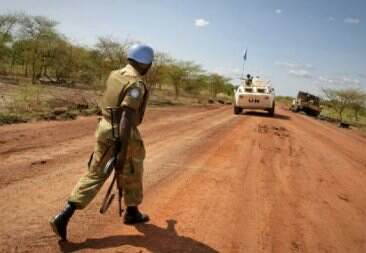Security Council renews mandate of peacekeepers in Abyei for six months
November 15, 2017 (NEW YORK/JUBA) – The Security Council on Wednesday extended until 15 May 2018 the mandate of the United Nations peacekeeping force in Abyei, a contested area on the Sudan and South Sudan border.

The Council also extended until 15 April 2018 UNISFA’s support for the Joint Border Verification and Monitoring Mechanism, which was established by the two countries as part of the negotiations on South Sudan’s secession from Sudan in July 2011.
The 15-member Council, however, decided that this renewal of UNISFA’s support for the Mechanism will be “the final such extension” unless Sudan and South Sudan ensure the free, unhindered and expeditious movement to and from Abyei and throughout the Safe Demilitarized Border Zone of all personnel, as well as equipment, provisions, supplies and other goods, including vehicles, aircraft, and spare parts, which are for the exclusive and official use of UNISFA.
Meanwhile the Security Council further decided to maintain the authorized troop ceiling of 4,791 until 15 April 2018, but the ceiling will decrease to 4,235 unless the Council decides to extend UNISFA’s support for the Mechanism.
The United States representative to the UN welcomed the mandate extensions, but expressed regret at the lack of progress on implementing agreements, including those related to the Mechanism, citing delays in granting UNISFA access to helipads and the presence of police in areas that they were prohibited from entering as examples of that lack of cooperation.
South Sudan’s ambassador to the UN, Akuei Bona Malwal, also welcomed the extension of UNISFA’s mandate, hailing its accomplishments as well as Ethiopia’s contributions to the force.
“This extension comes at a time when the Republic of South Sudan and the Republic of Sudan, through their leaderships, renewed their resolves in solving any outstanding differences within the agreed channels established,” said Malwal.
He added, “Hopefully, through the mandate extension, the people of Abyei would hopefully realize lasting peace as a permanent settlement was sought under the auspices of the African Union High?Level Implementation Panel.
On 27 June 2011, the Security Council, by its resolution 1990, responded to the urgent situation in the disputed region of Abyei by establishing the UNISFA.
UNISFA’s establishment came after the Sudanese government and the Sudan People’s Liberation Movement (SPLM) in the south reached an agreement in Addis Ababa, Ethiopia, to demilitarise Abyei and let Ethiopian troops monitor the area.
Abyei, according to the 2005 Comprehensive Peace Agreement (CPA) provides that the contested territory remains part of the north until the organisation of a referendum determines its fate. The difference over who will participate in the referendum prevents the two countries from holding the agreed referendum.
However, the Dinka Ngok organised a unilateral referendum from 27 to 29 October 2013 to say they want to join the Republic of South Sudan. Khartoum, Juba, the African Union and the international community did not recognise outcomes of the vote.
(ST)
